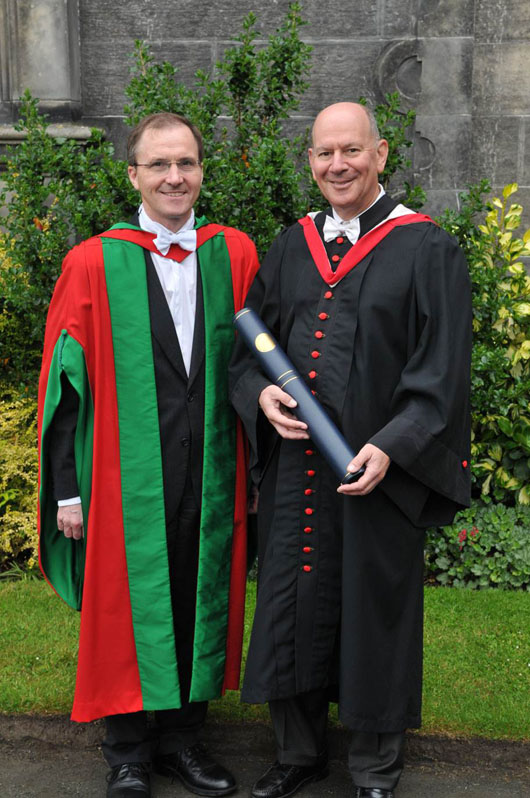Laureation Address – Mr Jesse Huntley Ausubel
Mr Jesse Huntley Ausubel
Honorary Degree of Doctor of Laws
Laureation by Professor Ian Boyd
School of Biology
Thursday 21 June 2012

Chancellor, it is my privilege to present for the Degree of Doctor of Laws, honoris causa, Jesse Huntley Ausubel.
Jesse Ausubel is Director of the Program for the Human Environment at The Rockefeller University and a Vice President of the Alfred P Sloan Foundation in New York City.
For over three decades Mr Ausubel has pursued the vision of a large, prosperous society that emits little or nothing harmful and spares large amounts of land and sea for nature. His work has spanned energy and materials, forests and farms, marine life, human population, and climate as well as engineering, earth, life, and social sciences.
He approaches great challenges with collegial and innovative organisation and searches for technological solutions to environmental problems.
Mr Ausubel spent most of the first decade of his career in Washington DC working on industrial pollution for the US National Academy of Sciences and National Academy of Engineering. On behalf of these Academies, he was one of the main organisers of the first UN World Climate Conference in Geneva in 1979, an event which substantially elevated global warming on scientific and political agendas and created the World Climate Program.
During 1979-1981 Mr Ausubel worked at the International Institute for Applied Systems Analysis, a think-tank near Vienna, established by the US and Soviet academies of sciences to research common problems of industrialised societies amidst the Cold War. This stimulated a career-long interest in the relations of science and international diplomacy.
Mr Ausubel coordinated and wrote much of the 1983 US National Academy of Sciences report on Changing Climate, the first comprehensive review of the greenhouse effect. The report broke ground in areas ranging from the release of frozen sea floor methane to carbon taxes.
In 1989, Mr Ausubel moved to The Rockefeller University to establish a research program on the long-term interactions of technology and the environment. He then served concurrently at The Rockefeller and as Director of Studies for the Carnegie Commission on Science, Technology, and Government. The Commission, sponsored by the Carnegie Corporation of New York, sought ways for American government at all levels, as well as international organizations, to use scientific and technical expertise better.
Mr Ausubel has authored or co-authored many seminal reports. The subjects include the “dematerialisation” of modern economies and the “decarbonisation” of the energy system. At the heart of his dematerialization concept is the question “How much land can 10 billion people spare for Nature?” The work about treading lightly on the land reached a peak in a widely reported 2006 paper arguing that the end of deforestation may be in sight.
Concerned about ocean as well as land, Mr Ausubel initiated in 2000 the decade-long Census of Marine Life, an international assessment of the diversity, distribution, and abundance of life in the oceans. This involved more than 2,700 scientists in 80 countries and reported what did, what does, and what will live in the oceans. As a part of this he recognised the need to be able to quickly identify species so he started the Barcode of Life Initiative, which provides short DNA sequences to identify efficiently all species of animals, plants, and fungi.
As a result of the Census of Marine Life more than 1,500,000 specimens from about 150,000 species of marine and terrestrial animals and plants now have DNA barcodes, and the Consortium for the Barcode of Life embraces more than 200 organisations in 50 countries.
Mr Ausubel also initially led the formulation of the freely available, online Encyclopaedia of Life to realise Harvard naturalist E O Wilson’s vision of an expandable web page for every species. The Encyclopaedia now contains 130,000 marine species and is available in Spanish and Arabic as well as English. He is also a trustee of the Richard Lounsbery Foundation, the first philanthropic foundation to support the Wikipedia and the leading foundation supporting Science & Diplomacy.
Chancellor, Ladies and Gentlemen most of us know little about the great people who are constantly busy behind the scenes trying to keep our planet and humanity on roughly an even keel. Today, we have the pleasure of honouring one of them. Mr Ausubel has received many honours in the past but perhaps the most lasting and outstanding was the one bestowed upon him by the 2,700 scientists working on the Census of Marine Life. They honoured him by naming a new species after him Dinochelus ausubeli. Those classics scholars amongst you will probably be ahead of me. It is Ausubel’s mighty-clawed lobster.
Chancellor, in recognition of his major contribution to the science and diplomacy of sustainable development I invite you to confer on Jesse Huntley Ausubel the Degree of Doctor of Laws, honoris causa.
Category University news